|
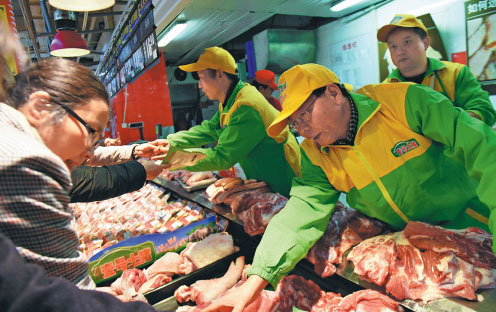
Lu Buxuan (right), founder of a pork retail chain, promotes products at a supermarket in Hangzhou, Zhejiang province, on Wednesday. The chain has more than 1,000 stores in major cities, and sells the meat from 300,000 pigs each year. Last year, its sales revenue exceeded 1 billion yuan ($150 million). Long Wei / for China Daily
|
China's meat sector was rocked when a report claimed consumption of red and processed meats increased the risk of cancer. Having overcome the scare, manufacturers are now gearing up to raise production. Shan Juan reports.
China is the world's biggest consumer of pork - accounting for about half of global consumption every year - and processed meats. So, when the World Health Organization's International Agency for Research on Cancer published a report that suggested consumption of red and processed meats could be a contributory factor in cancer, especially colorectal, the nation's meat-processing industry expressed dismay and prepared for the worst.
However, despite the industry's worst fears, the impact of the IARC report appears to have been short-lived.
An employee in the sales department of Yurun Group, one of China's biggest meat suppliers, in Nanjing, Jiangsu province, said overall sales of the company's meat products, mostly the processed variety, haven't shown any signs of long-term decline, despite Yurun's stock price plunging by almost 3.5 percent in the immediate wake of the report.
Wang Chuanxi, who sells processed meat at a Carrefour supermarket in northeast Beijing, said that initially sales of bacon and sausages were affected by the report, "the number of customers still dropped by at least 50 percent in the first few days after publication." So the supermarket responded by offering discounts - such as reducing the price of 1 kilogram packets of bacon by 20 yuan ($3) - and other promotions to lure customers back. Although sales later recovered, they have still not returned to pre-report levels.
The term "red meat" refers to fresh beef, veal, pork and mutton, while "processed" refers to meats where the flavor has been enriched and shelf life extended through salting, curing, fermentation or smoking and includes both red meat and poultry, such as hot dogs, sausages, corned beef and chicken.
The IARC report, published in October, said consumption of red meat is probably carcinogenic for humans, and classified the level of risk as Group 2A. Meanwhile, processed meat was deemed as carcinogenic and designated as Group 1, the same classification as smoking and excessive alcohol consumption.
Kurt Straif, a program director at the IARC, said the risk is small, but significant. "For an individual, the risk of developing colorectal cancer because of their consumption of processed meat remains small, but this risk increases with the amount of meat eaten," he said.
|
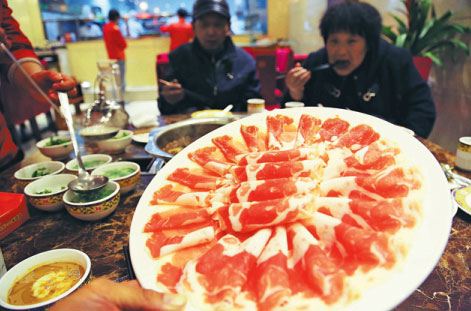
Sliced lamb is a popular dish among diners at hotpot restaurants. Geng Guoqing / for China Daily
|
Global impact
According to the report, if a person eats 50 grams of processed meat every day, the risk of contracting colorectal cancer rises by 18 percent, while daily consumption of 100 grams of red meat raises the risk by 17 percent.
"In view of the large number of people who eat processed meat, the global impact on the incidence of cancer is of public health significance," Straif said.
The IARC experts considered more than 800 studies - conducted in a number of countries and among populations with varied diets - that investigated links between the incidence of more than a dozen types of cancers with the consumption of red or processed meat. The most influential evidence came from large prospective cohort studies conducted over the past 20 years.
Christopher Wild, director of the IARC, said: "These findings further support current public health recommendations to limit the intake of meat."
In the meantime, as red meat has nutritional value, the findings are important in helping national governments and international regulatory agencies conduct assessments to balance the risks and benefits of eating red and processed meat, and then provide the best possible dietary recommendations, he said.
A complex disease
Chen Wanqing, director of the Chinese National Central Cancer Registry at the National Health and Family Planning Commission, said cancer is an extremely complex disease and cannot be caused by a single food source.
However, he conceded that IARC is a world-renowned academic organization and the findings were evidence-based. "They are trustworthy," he said. "The exact causes of cancer remain unknown and a balanced diet coupled with a healthy lifestyle is the key to human health."
Fang Yu, chief nutritionist at the Beijing Cancer Hospital, said the IARC report should not be used to promote a complete ban on red meat.
"It's meaningless to talk about carcinogens without mentioning the amount consumed," she said, but recommended maximum monthly consumption of 500 grams of red meat per person and suggested that people should not eat any processed meats.
Dwight W. Clark, medical director of the US-Sino HeartCare Center in Beijing, said that consumption of red or processed meat is not only associated with cancer, but also with other illnesses, such as heart disease.
|
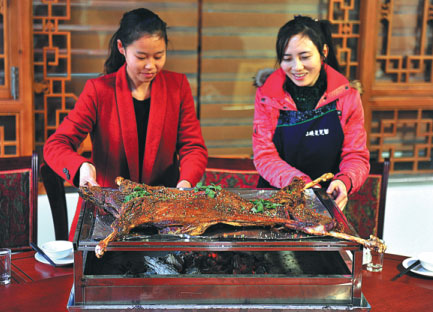
A whole roast lamb is served at a rural home restaurant in Yichang, Hubei province. Zhang Guorong / for China Daily
|
A study by the National Institutes of Health in the US involving more than 500,000 people in the US found that those who regularly ate large portions of red and processed meats over a 10-year-period were likely to die earlier than their peers who ate little of either.
People who ate about 113 grams of red meat every day were more likely to die from cancer or heart disease than those who ate small amounts, roughly 14 grams a day, according to the study, although the scientists involved classified the increased risk as "modest".
Unsurprisingly, the meat industry has rebuffed suggestions that red or processed meat can cause, or contribute, to cancer, adding that lean red meat fits the dietary requirements for healthy cardiac function.
Janet Riley, a senior vice-president at the American Meat Institute, an industry group, said the study, which asked participants to list all the foods they ate every day, were unable to demonstrate cause and effect.
"Many of these suggestions could be nothing more than statistical noise," she said.
Despite industry objections, other studies have discovered similar links to those outlined in the IARC report. One study in the US, which followed 72,000 women for 18 years found that people who regularly ate a Western diet high in red and processed meats, desserts, refined grains and French fries had a higher risk of heart disease and cancer than those who didn't.
"Changing Climate, Changing Diets: Pathways to Lower Meat Consumption", a report published by the Royal Institute of International Affairs, an independent policy institute in London, said that globally, meat consumption has reached an unhealthy level and is still rising. Excessive consumption of meat has contributed to rising levels of obesity and chronic illnesses, such as cancer and type-2 diabetes, it said.
|
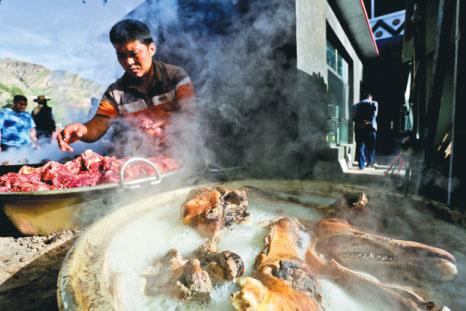
Beef and mutton are boiled and served to guests at a wedding in the Sunan Yugur autonomous county in Gansu province. Wang Jiang / Xinhua
|
Meanwhile, the consumption of meat also has an environmental impact, according to the report, which concluded that the growing appetite for meat has become one of the major drivers of climate change because the livestock sector accounts for about 15 percent of global emissions, equivalent to the exhaust emissions of all the vehicles in the world. Reducing meat consumption worldwide will be critical to keeping global warming below the "danger level" of 2C, the major goal of recent climate negotiations in Paris, it concluded.
Dietary changes
Chen Chunming, a nutritionist in Beijing, said Chinese academics noticed noticeable change in the national diet - increased consumption of protein, mainly by eating meat - in the wake of World War II. However, the trend accelerated as a result of the reform and open-up policy in the late 1970s.
Government statistics show that before the war, the Chinese diet was 98 percent plant-based, and meat was used sparingly, mainly as a form of flavoring.
Official statistics show that in 2012, annual meat consumption averaged nearly 63 kg per person, compared with 12.7 kg in 1980.
Pork accounts for the lion's share of sales, but consumption of "healthier" white meats, such as poultry, has also increased steadily.
"Meat consumption continues to show an upward trend," Chen said, although he added that the figures in China are lower than in the US where each person eats an average 106 kg of meat every year.
Now, not only is the consumption of meat a fact of daily life, but Chinese people are eating it in larger quantities, according to Wang Xinpeng, a beef salesman at a supermarket in Beijing's Chaoyang district, who said 150-gram flavored steaks are becoming increasingly popular with his customers.
"Such a large amount of meat at each serving isn't my thing, but the Chinese, particularly younger people, eat meat a different way now," he said, adding that some of his regular customers eat steak for breakfast every other day. "They really are meat lovers," he said.
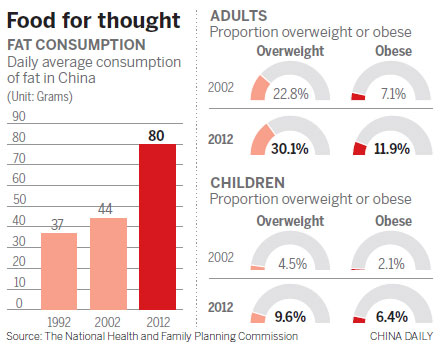
Demand set to soar
China's meat industry is now preparing for even higher demand in the years to come, especially after changes to the national family planning policy that will allow most couples to have two children rather than one.
This year will see the completion of the world's largest animal cloning facility, in the Northern port city of Tianjin, where beef and dairy cattle will be cloned for food production and also to improve livestock strains.
Xu Xiaochun, chairman of the Boyalife Group in Jiangsu province, the country's only commercial provider of cloned animals, said the Chinese market for cloned beef has huge potential because there has been a shortage for several years.
The rise in the consumption of meat in China echoes findings by statisticians that dietary habits change as a society becomes more prosperous, more specifically, rising prosperity results in increased consumption of protein, primarily from meat.
Max Rubner, an academic and researcher in the US in the early part of the last century, believed that high protein consumption was a sign of civilization and the right of civilized people. Elitism and arrogance dominated much of the burgeoning field of nutrition in the 19th century, and the "lower classes" were considered lazy or inept as a result of not eating enough meat or protein.
Rubner's argument was partially endorsed by T. Colin Campbell, the Jacob Gould Schurman Professor Emeritus of Nutritional Biochemistry at Cornell University. In his bestselling book The China Study, Campbell concluded that a cultural bias had become firmly entrenched: civilized people ate proteins; wealthy people ate meat; and the poor ate staple foods, such as potatoes and bread. "These changing dietary habits are in tandem with the increasing GDP," he said.
However, he also said the concept that bigger is better, more civilized and perhaps even more spiritual, was not only incorrect, but also harmful.
The incidence of heart disease, strokes and certain cancers began to rise with the high-protein diet, particularly animal fats, and China should be fully aware of the situation and take preemptive measures, according to Clarke.
With the increased consumption of meat, usually coupled with the increased intake of refined carbohydrates and high-calorie foods, the mortality rates from infections and malnutrition decreased dramatically, but that good news is offset by the fact that the number of deaths from heart attacks, strokes and cancers began rising, he said.
By Shan Juan (China Daily)
Using WeChat? Scan QR Code or Press the Fingerprint Below ↓
--- (Or ADD WeChat ID: OKOKOKOKnet)
